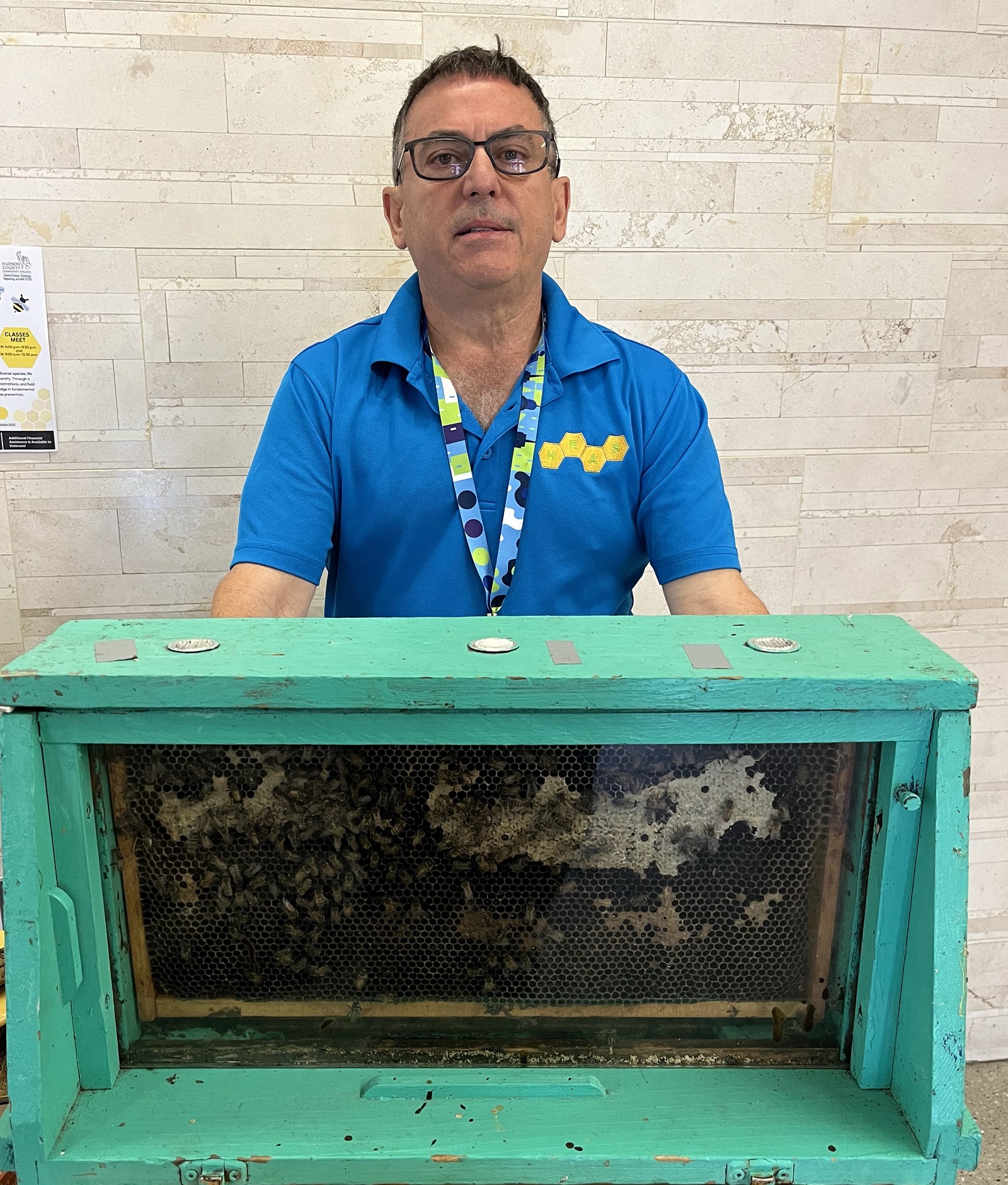A Beekeeping Course in the Middle of Jersey City? Hudson County Community College Offers It!
November 14, 2024

Professor Antonio Quinlan’s Introduction to Beekeeping Course is free for veterans and open to all students.
Hudson County Community College’s new Introduction to Beekeeping Science gives students hands-on experience in a unique field.
November 14, 2024, Jersey City, NJ – Hudson County Community College’s (HCCC) Journal Square campus might not be where
one would expect to find apiaries full of honeybees and students learning the ins
and outs of beekeeping, but HCCC is one of the rare urban community colleges, as well
as one of the few community colleges in New Jersey, to offer a course in beekeeping
sciences. After launching in 2024, HCCC will again offer Introduction to Beekeeping
in the Spring 2025 semester.
Students can take the credit-bearing course as part of an A.S. degree in Environmental Science from HCCC’s School of Science, Technology, Engineering and Mathematics (STEM). Professor Antonio Quinlan, a longtime beekeeper and the founder and Executive Director of the Hudson River Apiary Society, teaches the course. The Society is a group dedicated to educating the public about bees and empowering the community to preserve the honeybee population and the environment. Under Quinlan’s sage guidance, HCCC students are learning about the many different species of honeybees and their lifecycles, gaining knowledge of important issues like disease prevention and ethical beekeeping practices, and getting valuable hands-on experience in fundamental beekeeping techniques. They are also learning how to safely handle honeybees, and even assembling their own beehives.
Urban beekeeping in a setting like Hudson County comes with its own challenges and safety considerations because of the higher population density, but Quinlan knows New Jersey’s urban environment like the back of his hand – he learned the craft from his father and grandfather and started his first apiary right in his backyard in North Bergen. His urban beekeeping practice started to generate a “buzz” in the neighborhood, which inspired him to embark on his lifelong journey of teaching the community about bees. Quinlan’s infectious enthusiasm for beekeeping even earned him the nickname “Mr. Bee” from former New Jersey Governor and current CEO of NJ Reentry Corporation Jim McGreevey at Jersey City’s Bergen Square Day.
Beyond the novelty and uniqueness of a beekeeping science class in the middle of Jersey City’s Journal Square neighborhood, beekeeping is an important topic that affects us all – bees play a crucial role in the planet’s ecosystem and in our food chain. Bees are also crucial to our country’s agricultural economy – each year, bees increase crop values by an estimated $15 billion and pollinate approximately 80% of all cultivated crops. Honey also has considerable health benefits, and Quinlan points out that honey was “nature’s first medicinal product,” used for healing purposes since ancient times, and that bees and honey are mentioned in ancient religious texts, including the Bible and the Quran.
In addition to environmental and health benefits, beekeeping also brings many benefits to those engaged in the practice themselves. Quinlan, a military veteran, is passionate about noting that beekeeping can help veterans who are dealing with Post-traumatic Stress Disorder (PTSD). He knows of beekeeping’s therapeutic value firsthand because he says it played a major role in his own journey of overcoming PTSD. Thanks to a grant from Jersey City, the innovative course is now free for veterans.
Other health and psychological benefits of beekeeping include lowered stress levels, improved mental focus, confidence, and fear management. These therapeutic and psychological qualities also make beekeeping a vocation that can help rehabilitate prisoners and reduce recidivism.
HCCC President Dr. Christopher Reber noted, “Our Introduction to Beekeeping Science course is a prime example of how HCCC is consistently at the forefront of rolling out unique, innovative educational programming that enriches our students’ education and empowers them to make a meaningful impact on our environment and our communities. Introduction to Beekeeping Science is a prime example of how we’re creating hands-on, interdisciplinary learning opportunities that address critical issues like sustainability, mental health, and workforce readiness.”
Dr. Burl Yearwood, Dean of the HCCC School of Science, Technology, Engineering, and Mathematics (STEM) stated, “HCCC’s School of STEM is committed to providing our students with opportunities to explore meaningful, hands-on learning that addresses real-world challenges. The Introduction to Beekeeping Science course exemplifies this mission, connecting students to critical environmental and agricultural issues while also providing therapeutic and practical skills that can positively impact their lives and communities. We are proud to support such a unique program, one that educates our students about the vital role of honeybees and empowers them to become active stewards of the ecosystem we all share.”
Unfortunately, bees often face a hostile environment in today’s world. They are in more danger than ever before, from pesticides, the destruction of vegetation in urban areas, climate change, and a myriad of other threats. Quinlan explains there is a widespread lack of understanding of bees and the important role they play in our world, which motivates him to continue educating the broader public.
Quinlan has been beekeeping for years, and his longtime interest has taken him around the world. He finds that most beekeepers he meets are in their 70s and 80s, so passing on the tools of the trade to the next generation is vital and something he finds particularly rewarding, given his unmistakable passion for the art. He looks forward to introducing more HCCC students to the world of beekeeping and proudly points out that “If we can successfully cultivate thriving, productive honeybee colonies in the middle of Jersey City, it shows that we can do it anywhere.”